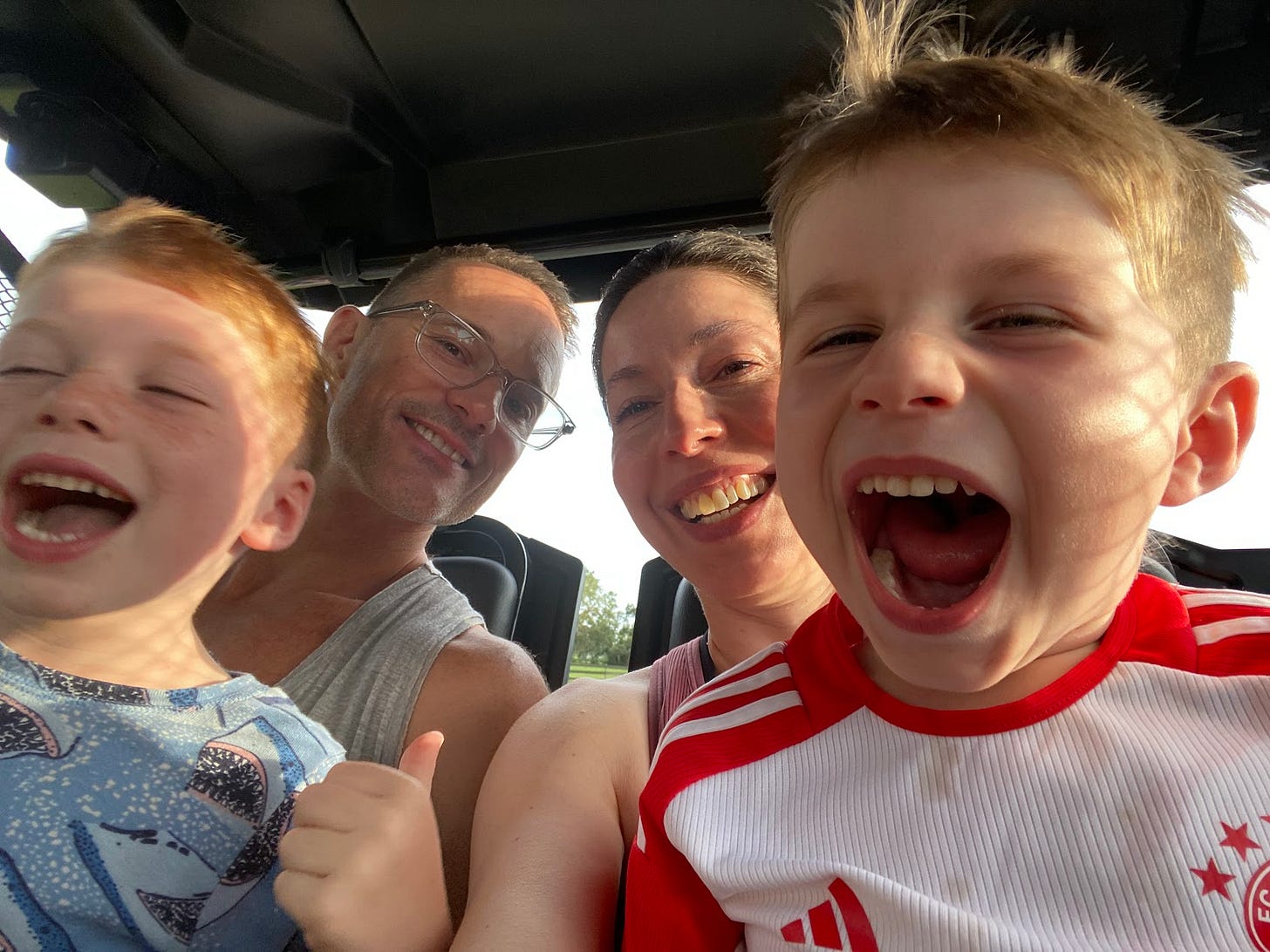🔥Welcome to Volume #00107!🔥
I’m Christian Champ. This is ☯️The Middle Way Newsletter ☯️. It is a place where I write, explore, share, and invite you along for the journey.
If you enjoy the newsletter, please share it with your friends.
🥊Why We Need to Fight the Power🥊
"From the heart
It's a start, a work of art
To revolutionize, make a change, nothing's strange
People, people, we are the same
No, we're not the same
'Cause we don't know the game
What we need is awareness; we can't get careless
You say what is this?
My beloved, let's get down to business
Mental self-defensive fitness
Don't rush the show
You gotta go for what you know
Make everybody see, in order to fight the powers that be
Lemme hear you say
Fight the Power"
- Public Enemy, Fight the Power
Our heads bobbed to the beat.
Our pointer fingers tapped the air as Chuck D came in with his lyrics.
Our minds melted by the power, force, and rawness that smacked us in the face.
Our teal Mazda minivan rocked back and forth.
We heard Public Enemy and wanted to fight the power around us.
As an 11-year-old, hearing the title track from Do the Right Thing soundtrack, fresh off a trip to Camelot Music, changed my world.
1989 was the summer, and like the lyrics in the song, the music hit my heart.
The message became an anthem for me. It reminds us to question the things around us. It is about curiosity and asking questions. Wondering why things were the way they were. We need to understand the game if we want to play.
The song reminds us that randomness, luck, and path dependence show up everywhere.
Fighting the power is about stepping back and taking inventory. Then, we figure out our path forward.
We question the default path. We question the roads most traveled. When things get promoted, we need to investigate them.
We push back against the pulls of life and make sure we want to flow in that direction.
We see the "average" and realize it is not for us. We see people pulled in directions that separate them from their minds and bodies and fight that outcome.
We fight the power when we go for what we know. We get down to business when we make a change.
Over time, fighting the power increases its usefulness and becomes a necessity.
We get pulled by technology that wants to eat our lives. We need to fight against the food industry and advertising that wants to eat our health.
We must fight against the power of being sedentary, pushing ourselves to move and do the hard things. Life got so easy in a wrong way that we need to fight the power of not doing the things that come easily.
We fight the power by being intentional and taking the more challenging route for an easier life. We need to dodge mind viruses like politics, culture wars, or finite games like jealousy and envy.
We want to play the game and remain above the game. We want to be kings and queens, not pawns.
Over time, we want to grow our wisdom to fight the right power.
🧠Things to Think About🧠
Morgan Housel on Smarts vs. Intelligence
Morgan starts off by defining each and how we want to have both. That being said, smarts beat intelligence over the long term.
I’d define intelligence vs. smart like this: Intelligent people understand technical details, smart people understand emotional details.
Or maybe:
Intelligence: Good memory, logic, math skills, test-taking ability, rule-following.
Smart: High degree of empathy, bullshit detection, organization, communication skills, persuasion, social awareness, understanding the consequences of your actions.
The best story wins. This is smart in action. We can increase our intelligence and smarts, but it’s easier to increase our smarts. It takes intention, coaching, and feedback. We have the ability to do it.
Recognizing that the best story wins.
Not the best answer. Not the accurate answer. Not the answer people need to hear. The winner is just whoever gets people to pay attention and nod their heads in agreement.
If you’re merely intelligent, you might focus all of your effort on finding precise truth. If you’re smart, you’ll focus just as much effort on delivering an effective message around that truth, realizing that the most powerful truth does no good if you can’t get people to pay attention to it.
Paul Bloom offers Advice to Teachers
My favorite three ideas on his list that can be applied in most situations.
1. Enthusiasm. When you’re in class, you should act like there’s no place in the world you’d rather be. Enthusiasm is infectious—it makes your audience perk up, enjoy the material more, like you more, and learn more.
2. Confidence. Act as if you know your shit. Act as if you’ve done this a hundred times before, and it’s always gone smashingly. This will reassure the students that they’re in good hands and they’ll learn better.
3. Be yourself. Everyone has strength; teach in a way that aligns with what you’re good at. As an example, if you’re funny, engage the students with humor—if not, don’t bother. Serious and intense is also a fine way to run a class ... but so is cheerful and mellow. There are a lot of ways to do this right.
Autotranslucence writes about how she tries to Become a Magician
Magic creates a new version of us.
Not only is any sufficiently advanced technology indistinguishable from magic; any sufficiently advanced technologist seems like a magician. In order to write the new version of this life description, I need to imagine a version of myself who, by definition, I cannot understand. If I understood her she wouldn’t be magical.
When it is magic, we don’t know where things end up.
And that, in fact, is my definition of magic – competence so much more advanced than yours with such alien mental models that you cannot predict the outcomes of the model at all.
Find the magicians to grow. The magicians don’t follow a linear path and can lead us to
One of my heuristics for growth is to seek out the magicians, and find the magic. Often without noticing, your progress in aspects of life or all of it unconsciously becomes linear. You made a certain amount of money last year, so you aim to make some ‘reasonable’ proportion more this year. But you are largely using the same tools to get 2x as you used to get x, and so you end up with diminishing marginal returns as you wring the remaining juice out of the initial strategy.
We are all magicians to someone else.
The way to extraordinary growth and changes often involves a fundamental ontological or ‘lens’ shift in how you see the world. Magicians are wearing not just better, but fundamentally differently shaped lenses to the rest of us. And regardless of your skills and experience, it is likely that you are a magician to someone else.
We need to find the magicians to become a better magician.
Meeting magicians is the first step to becoming one – when you are attempting to learn implicit knowledge that by definition you don’t understand, it is important to have a bunch of examples in front of you to feed your brain’s pattern-recognition systems. This will start to change your worldview without the controlling ‘you’ explicitly approving or denying every new belief or framework.
🎧Things to Listen, See, and Watch 🎧
Rory Sutherland Talks with Rick Rubin on Tetragrammaton
This was one of the best podcasts I’ve listened to recently.
My Snip Notes of the podcast
1. Sequential logic is not the best approach to problem-solving. Problem-solving is more Darwinian and iterative, relying on subconscious mental processes and tacit skills.
2. Challenging assumptions in expertise is important to ensure balance in decision-making processes.
3. The burden of proof for a creative act is 20 times greater and often influenced by economics. Creative individuals embrace contradictions and find innovative solutions.
4. Changing our frame of reference can lead to different perspectives and innovative solutions.
5. Comedy and humor function as problem-solving mechanisms, allowing us to mock-fight in a playful environment without the risk of actual violence.
6. Humans often assume they know how everything works and can control it.
7. Optimizing for the long term requires creative thinkers who can come up with new ideas.
8. Convenience plays a powerful role in the adoption of ideas and the slow adoption of great ideas.
9. People spend more on wine to mark the significance of an event rather than for the quality of the wine itself.
10. Patience is important for creative individuals, as forcing creativity is difficult.
11. Creative people have annoying traits like obsessing over small things and ignoring big things, but these traits can lead to unique and whimsical decisions.
12. Great and stupid things happen for different reasons. The world is Newtonian for physicists but disastrous for economists.
13. The interface plays a significant role in determining human behavior.
14. Capitalism is not just an efficiency mechanism but also a discovery mechanism.
15. Learning through teaching and exploring alternate perspectives can lead to win-win situations.
16. Two-way doors vs. one-way doors. Amazon Prime is not easily taken away once offered (one-way door). Testing anything that you can keep or eliminate is why we want to find the two-way doors.
17. Balancing customer satisfaction and designing customer service programs is important.
Seth Curry, as a college student, talks about people saying he is too small.
People doubt him heading into college and into the NBA. Remember that when you question what is possible. Seth became a magician.
Paths vs. Roads
The Middle Way is a big fan of finding our path, not taking the roads more traveled.
💣Words of Wisdom💣
"The lesson: even the most high-achieving, self-aware professionals need help sorting out their responses and learning how to practice." (Sally Jenkins, The Right Call)
"The path to success is paved with small wins. Even the grandest and most glorious victories rest on a string of modest but constructive steps forward." (Robert I. Sutton, Good Boss, Bad Boss)
"What were our lives like without technology? The problem with this line of questioning is that technology predated our humanness. Many other animals used tools millions of years before humans." (Kevin Kelly, What Technology Wants)
"Further, we reveal that when leaders are below the line, their primary commitment is to being right, and when they are above the line, their primary commitment is to learning." (Jim Dethmer, Diana Chapman, and Kaley Klemp, The 15 Commitments of Conscious Leadership)
"Feeling bad was just another guest, another cloud. There was no reason to ask it to leave. But my mind could now accept it, and from the acceptance, a distinct physical feeling of contentment pervaded my body." (Yongey Mingyur Rinpoche, Helen Tworkov, In Love With the World)
"Invent as many family rituals as you can handle with ease. Anything done on a schedule —large or small, significant or silly— can become a ritual. Repeated, consistently small routines become legendary. Anticipation is key." (Kevin Kelly, Excellent Advice for Living)
"The best marketers are farmers, not hunters. Plant, tend, plow, fertilize, weed, repeat. Let someone else race around after shiny objects." (Seth Godin, This Is Marketing)
"Becoming fluent, whether with writing or coding, helps you to develop your thinking, develop your voice, and develop your identity." (Mitchel Resnick, Ken Robinson, Lifelong Kindergarten)
"Focus on What Really Matters … Today and Tomorrow The vision of the eagle says this: If this won’t matter in an hour, a day, a week, or even a year, why should I allow it to matter now?" (Matthew Dicks and Elysha Dicks, Someday Is Today)
"Sometimes we love with nothing more than hope. Sometimes we cry with everything except tears. In the end that’s all there is: love and its duty, sorrow and its truth. In the end that’s all we have—to hold on tight until the dawn." (Gregory David Roberts, Shantaram)
"But one thing I've learned: Fragility is often a choice. If we train for old age like professional athletes, then we can offset significant physical decline and unlock serious health improvements. (Steven Kotler, Gnar Country)
"Why do most of us move on when we haven't yet mastered anything? We are afraid that we won't become great players, and that becomes a self-fulfilling prophecy." (Kenny Werner, Effortless Mastery)
"But that's not how it works. You have to make the best of whatever story you were born into, and if your story happens to suck ass, well, maybe you can do some good before you go." (Alix E. Harrow, A Mirror Mended)
"MY FIVE DON’TS: 1. Don’t ask, “Why me?” 2. Don’t expect sympathy. 3. Don’t bellyache. 4. Don’t keep accepting condolences. 5. Don’t blame others." (Bill Walsh, The Score Takes Care of Itself)
"Pressure," Peyton Manning likes to say, paraphrasing the legendary Pittsburgh Steelers coach Chuck Noll, "is something that you feel when you don't know what the hell to do." (Sally Jenkins, The Right Call)
"There is no better than adversity," Malcolm X would "Every defeat, every heartbreak, every loss, contains its own seed, its own lesson on how to improve your performance the next time." (Ryan Holiday, Courage Is Calling)
🙏Thanks for Reading🙏
What power do you need to fight to get the results you want?
Namaste.
Christian
The goal is to experience the joy that Isaac is feeling in this picture.

















Share this post